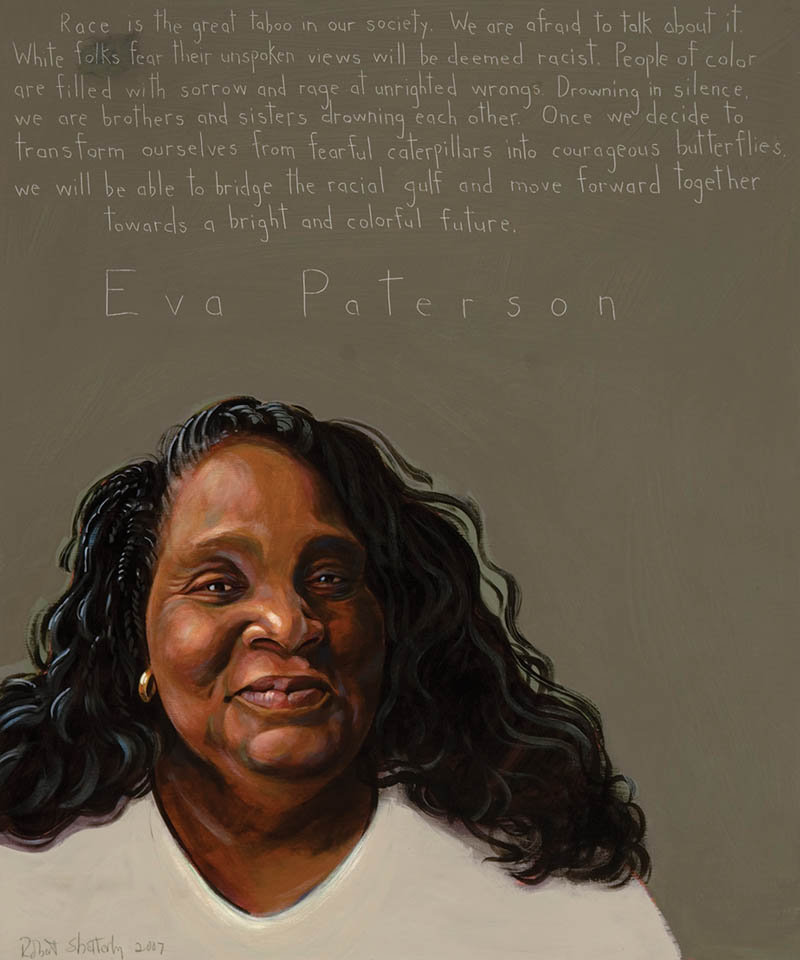
Eva Paterson
Civil Rights Lawyer : B. 1949
“Race is the great taboo in our society. We are afraid to talk about it. White folks fear their unspoken views will be deemed racist. People of color are filled with sorrow and rage at unrighted wrongs. Drowning in silence, we are brothers and sisters drowning each other. Once we decide to transform ourselves from fearful caterpillars into courageous butterflies, we will be able to bridge the racial gulf and move forward together towards a bright and colorful future.”
Biography
Twenty-year-old Eva Paterson first captured the nation’s attention when she debated Vice President Spiro T. Agnew on television in 1970. As student body president of Illinois’s Northwestern University, she respectfully disagreed with the second-most powerful man in America and, by most measures, won the debate.
Accused by Agnew of promoting violent protests of the Vietnam War and racial discrimination, Paterson objected, asserting her commitment to nonviolence. Then she charged Agnew with making things worse by scaring people: “You’re making people afraid of their own children. … They’re your children, they’re my parents’ children, they’re the children of this country. Yet you’re making people afraid of them. This is the greatest disservice. … When you make people afraid of each other, you isolate people. Maybe this is your goal, but I think this could only have a disastrous effect on the country.”
It wasn’t the last time Paterson would speak truth to power and win the day.
A few years later, armed with a law degree from UC Berkeley’s Boalt Hall School of Law, she took on agency after agency in her fight for social and economic justice. She started by suing the Oakland (California) police because they did so little to help battered women. She won that case and saw it become the model for how police departments across America deal with spousal abuse.
For Paterson, combating domestic violence was personal. “I come from a home with a lot of violence,” explains Paterson. “And when I was very young, I really tried to protect my mother from my father. I think it was a sense of ‘Hey, you can’t hit her. Stop that.’ And so I think some sense of being a warrior was being instilled at that point—of seeing something that seemed really wrong.
“When I was a baby lawyer in East Oakland, women would come in complaining they were being battered and the police wouldn’t help. … We settled that case in 1977. About ten years after I did that suit, I was on a panel about women, and the light bulb turned on. I realized I’d done that lawsuit for my mother.”
Paterson followed up that victory with many more. Other lawsuits she filed led to desegregating the San Francisco school system, putting Blacks and women on the force of the San Francisco Fire Department, and eliminating a “white collar test” that kept Asian Americans from gaining white-collar jobs with the federal government.
“It’s important to embody Dr. [Martin Luther] King’s notion that an injury to one is an injury to all,” says Paterson. When she’s asked why she works so hard for the benefit of others, she answers, “I don’t think I have a choice. I think I have to do this. I look at things and I know I have the ability to make a difference or to connect with people who can make a difference.”
She doesn’t always win, and she knows how hard it is sometimes for people to keep fighting in the face of defeat. But despair, she says, “is a tool of oppression. Do not let it get to you.”
Paterson now heads her own organization, the Equal Justice Society, and brings special focus to building coalitions.
“In my view, coalitions are not optional, they’re essential.” She says too many groups working to improve the world are isolated from one another. “We’re in our silos,” she says. “We all share a common vision of the world we’re trying to create, so we need to get out of our silos.”
“If we are not arm-in-arm while marching toward our dreams,” she writes in the Huffington Post, “we may be moving, but we are not a movement. … It won’t come easily. … It requires a commitment to staying in the fight over the long haul. Yet, we cannot afford to be poor students at it. Our communities are counting on us.”
Paterson grew up in Illinois, though as part of a military family, lived in England and France, as well.
As student president of Northwestern, she was dubbed a “peaceful warrior” by the media, called to testify before Congress, featured on the covers of Ebony and Jet magazines, and was named one of Mademoiselle’s “Ten Young Women of the Year.”
Her lifelong activism includes working for the Legal Aid Society of Alameda County; co-founding a shelter for battered women in Oakland; and serving as a member of the Lawyers’ Committee for Civil Rights, as vice president of the ACLU National Board, and as chair of both Equal Rights Advocates and the San Francisco Bar Association.
Programs
Americans Who Tell the Truth (AWTT) offers a variety of ways to engage with its portraits and portrait subjects. Host an exhibit, use our free lesson plans and educational programs, or engage with a member of the AWTT team or portrait subjects.

Education
AWTT has educational materials and lesson plans that ask students to grapple with truth, justice, and freedom.

Exhibits & Community Engagement
AWTT encourages community engagement programs and exhibits accompanied by public events that stimulate dialogue around citizenship, education, and activism.